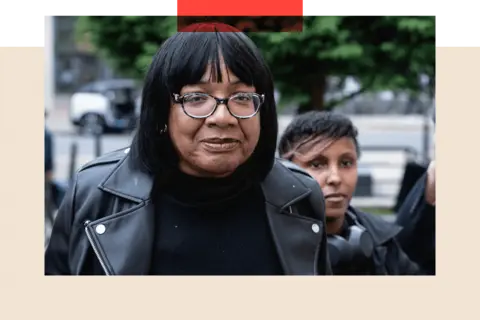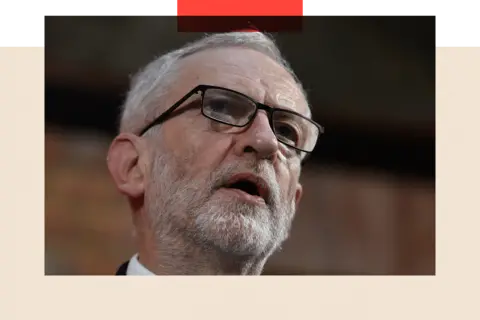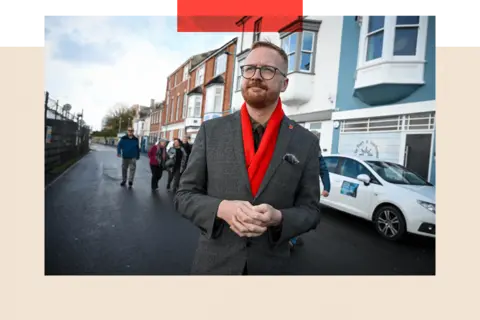ARTICLE AD BOX


18 minutes ago
Laura Kuenssberg,Sunday with Laura Kuenssberg, @bbclaurak

 Getty Images
Getty Images
“We’ll have to take them apart, piece by piece.”
A former Labour cabinet minister almost spat the words out in anger. I have never forgotten that conversation, even though it was nearly 10 years ago, because their fury was so hot, coming off them in waves.
The senior politician who was spitting chips in the summer of 2015 was apoplectic that the Left had propelled their man, Jeremy Corbyn, to Labour’s top job.
They were frustrated that Ed Miliband had allowed thousands of new Labour Party members to flood in, paying only £3 to join up, many of whom had gone on to elect Mr Corbyn leader. They were also depressed at the prospect of having to go through, as he saw it, the long, painful process of dismantling the Left all over again.
Memories of election drubbings in the 1980s and late-night party meetings in crowded rooms above South London pubs, as he and his allies battled to take the Left apart “piece by piece”, were still raw.
This week’s row over the future of Diane Abbott must be understood in the context of the decades-long battle for supremacy between different wings of the Labour Party.

 Getty Images
Getty Images
On Friday Keir Starmer said Dianne Abbott was free to stand as a Labour candidate
It’s a fight between the radical flank on the left and those who believe their tradition is closer to the public’s heartbeat. History suggests the outcome of that battle can have a direct impact on their election results. The party’s two worst defeats in modern times were under Michael Foot and Jeremy Corbyn, both from the left-wing tradition. Of course, there were particular circumstances in both cases.
Sir Keir Starmer may have been part of Mr Corbyn’s team but the Left’s power has waned under his leadership. He has sought to prise their fingers from the party machine and gain control, you might say, “piece by piece”.
But the latest piece of that process has resulted in a “massive own goal”, as one Labour source described it to me. It was widely thought that after a long career as the MP for Hackney North and Stoke Newington, Diane Abbott – the first black woman to be elected to Parliament and an icon on the Left - would want to stand down from her seat at this general election.
Just after the election date was announced, she was brought back into the fold as a Labour MP after a long suspension over comments she made in a letter to a newspaper that were seen as antisemitic and also offensive to Irish and Traveller people.
Now, it was thought, she could depart politics with dignity, rather than being handed her P45. But all that changed when a newspaper report appeared suggesting she would be banned from standing even if she wanted to.
“She was looking for a way to stand down with dignity then it was blown all up,” one shadow cabinet member told me.
Keir Starmer faced a backlash from the left of his party and others – but repeatedly insisted she had not been banned – and it would be up to Labour’s ruling National Executive Committee (NEC) to decide Ms Abbott’s fate.

 Getty Images
Getty Images
Diane Abbott was suspended as a Labour MP in April 2023
On Friday afternoon he tore up that position and declared that Ms Abbott was free to be a Labour candidate if she wanted to be.
This move threatens to give the impression that Sir Keir has picked a fight with the Left but wasn’t quite strong enough to win it.
The Tories have a shiny new attack line to hurl at Labour. And it has allowed the Labour left, who Starmer had kept at bay, to crow, with the campaign group, Momentum straight out of the blocks with a triumphant statement: “You come at the Queen you better not miss!”
It might have been preferable to back down publicly when he did, rather than allowing this row to run until Tuesday when the NEC was meant to make the final call.
A senior ally of the leader argued on Friday afternoon that it was time. "Everyone was aware of the symbolism. We had to to draw a line, it couldn’t just go on and on."
But it is still not official that Ms Abbott will definitely be a Labour candidate in Hackney. It’s a messy, partial end to a fight the Labour leadership didn’t need to have.
Whatever happens to Diane Abbott, the left-right argument has roared back, just as Labour should be hitting its campaigning stride.

 Getty Images
Getty Images
Former leader Jeremy Corbyn will be standing as an independent candidate at the election
There are public screams of “purge”, from parts of the Left and on some of the front pages. A senior union figure told me the leadership is “using the chance to settle scores, it is obvious what is going on. It is a real power move”.
But the official story from Team Starmer is that they are just trying to find the best possible candidates for the election. If that, by implication, means saying cheerio to some existing MPs, so be it.
But another Labour source told me: “Keir is more interested in competence than ideology… there is obviously a role for the left of the Labour Party but it has to be as part of a team rather than people who throw bricks at the Labour bus."
The truth of what is going on?
It’s perhaps a mixture of both.
The “blue suits” as they are sometimes nicknamed, the (mainly) youngish men who eagerly work for Keir Starmer, not surprisingly, do want to make sure that the party is standing candidates who will work hard and well, and once elected, will be part of the project, not push against them.
That has involved in some parts of the country imposing candidates on local parties, backing former party staffers and activists closely connected with Starmer’s team as the next MP.

 bbc
bbc
Sign up for the Off Air with Laura K newsletter to get Laura Kuenssberg's expert insight and insider stories every week, emailed directly to you.

 bbc
bbc
But is it a “purge”, when so far only a small handful of former MPs have actually been blocked?
One experienced source on the Left tells me, there are “elements of a purge, but elements of the leader wanting to bring in a group of people who reflect what he wants and what he wants to pursue in government’.
It’s “not simply jobs for the boys, it is also a more strategic objective to assist the general direction,” the source says.
But not everyone in the party is happy with that calm, gently critical analysis.
One former NEC member tells me: “Labour has had great left MPs throughout its history and they’ve shut down that broad church.
“The purge is not about change, it’s about what has been said by the leader… they cannot let the Left get in the driving seat again.”
Labour would argue there are valid reasons why left wingers such as Lloyd Russell Moyle and Fazia Shaheen have been barred from standing at the last minute. But that is not how these former candidates and their allies on the Left see it.
Others on the Left have seen their Labour careers ended. Most notably Jeremy Corbyn himself. He was suspended by the party in 2020 over his response to an inquiry into antisemitism in the party and will now stand for parliament as an independent.
The left leaning MP Beth Winter lost out in a selection battle forced by boundary changes. She was defeated by Gerald Jones, a shadow minister under Keir Starmer’s leadership.
And Jamie Driscoll, who won the 2019 North of Tyne mayor contest as a Labour candidate, was barred from standing for the party in 2024.
The way Diane Abbott has been treated stands in awkward contrast to the way a string of Tories, including Natalie Elphicke, Dan Poulter and Mark Logan, have been welcomed into Labour with open arms in recent weeks.

 Getty Images
Getty Images
Lloyd Russell-Moyle was first elected MP for Brighton Kemptown in 2017 but will not be the Labour candidate in the 2024 election
These arguments are happening in public at deafening volume because we are in a general election campaign, when Labour wants to be seen above all else as a sensible, credible force, and when many of the public will be taking a proper look at Keir Starmer for the first time.
The worst possible time to indulge in a big, fat – and avoidable – row. The plight of Diane Abbott could have been decided many months ago. The indecision looks like “the boys have treated her shabbily” says one party source.
A member of the shadow cabinet tells me only a few voters so far have brought the subject up on the doorstep, although they warn, “you have to be careful how this looks."
One focus group conducted by the polling group More in Common on Thursday night reported the issue was raised unprompted by members of the public thinking about who to choose.
One voter switching from Conservative to Labour said: “I worry if I was going to change from one party to another, would I trust somebody that's basically stabbing their own party member in the back?”
The group of voters it might concern the most, identified as the “progressive activist” by More In Common, makes up about 12% of the voting public, the most left-wing portion.
Two thirds of them, by their calculation, chose Labour, under Jeremy Corbyn, in 2019. That figure has already slid to a 60%, with evidence of many shifting across to the Greens.
The local election results already demonstrated there’s been a cost from Labour’s position on Gaza, in terms of lost seats, and there’s been disappointment among some environmental activists at the party shifting on its plans, although Keir Starmer would deny their ambitions have been watered down.
The relief for Labour is that most of the voters who the so-called “purge” might upset live in big cities and student towns where they already rack up chunky majorities.
So perhaps discontent over candidate selection will not make much of a difference on polling day. There is an argument too, still made by the most enthusiastic advocates of Starmer’s efforts to distance himself from Jeremy Corbyn, that having a massive public barney with one of Mr Corbyn’s friends is evidence of how much the party has moved on.
But this argument may be too clever by half, in the context of a campaign where every vote matters.
“Never buy into the idea that it’s a masterplan,” says another Labour source, “no one ever wants any public messiness - it doesn’t help”.
And, as one senior Labour MP suggested to me, the risk is the public will not come away with the impression that Starmer is different to Corbyn, they will just see a big, nasty row. Not ideal when Keir Starmer wants also to attack the Tories for fighting amongst themselves.

 Getty Images
Getty Images
Faiza Shaheen was this week deselected as Labour's candidate in the Chingford and Woodford Green seat
Does this saga also risk Keir Starmer sowing bad seeds for the future?
A powerful figure in the Labour movement told me “some solid, middle of the road people are unhappy, people they need to keep their head when things get tough further on. There will be blowback”.
Labour have been miles ahead in the polls for many months, “they should just chill,” says another, “they are more paranoid than they need to be”.
It’s suggested by that source that provoking a row over the exit of a few of Jeremy Corbyn’s fellow travellers is making the classic political mistake, fighting the last war.
If Keir Starmer is on the brink of Number 10, as the polls still suggest, maybe the logic of going after the remnants of the Corbyn regime is past its sell by date.
He has been fighting as Labour leader to show he is safe, different to the Tories but not too different. Promising change, but sensible and credible, designed to provide reassurance to voters who’d previously chosen the Conservatives, to broaden the party’s appeal.
But the next Parliament may well present him with a completely different political terrain, with less Tory pressure and more from the “broader Left”, in his own party and from the Lib Dems, Greens, SNP and Plaid too.
Souring the atmosphere as the Abbott saga threatens to do may create an uneasy “impression of what the leadership is really prepared to do,” as one source put it.
The fuss over one politician, Diane Abbott, is unlikely to change the result on 4 July.
Keir Starmer has successfully turned the Labour Party to concentrate on the country not its own woes, but the Abbott saga shows that internal disputes can snap back, exposing painful and ancient roots.
Political leaders have to establish their power over their parties and then demonstrate it to the public.
But wearing a party rosette is not the same as carrying blind faith in the leader - that authority has to be proven and then maintained, you might say, piece by piece.
BBC InDepth is the new home on the website and app for the best analysis and expertise from our top journalists. Under a distinctive new brand, we’ll bring you fresh perspectives that challenge assumptions, and deep reporting on the biggest issues to help you make sense of a complex world. And we’ll be showcasing thought-provoking content from across BBC Sounds and iPlayer too. We’re starting small but thinking big, and we want to know what you think - you can send us your feedback by clicking on the button below.

 7 months ago
61
7 months ago
61








 English (US) ·
English (US) ·